The Poor are Great Economists
The most sophisticated literature on poverty traps I have come across suggests the radical idea that the poor are actually great economists, and that they have a clear idea of what holds them back. My experience in Africa amidst masses of people struggling to rise out of challenging circumstances, validated this for me.
People there know exactly what they need to move their lives forward. Financing for their businesses would make an immediate positive impact on their lives.
Still, realising this as an intellectual concept is different from doing anything to change this.
My meeting with a young man called Ibrahim pushed me over the line to do something about this.
Ibrahim runs the kiosk in the compound of the building that our logistics company is located at in Kigali City, Rwanda. He has become friends with us over the years we’ve been there, and one day approached me to talk about his business. I was curious about the economics of his business, so I invited him to a short chat in our office.
Ibrahim asked a friend to mind his kiosk, and what was intended as a short conversation went for over 3 hours. I asked and he shared the details of his stock, sales, costs and profits. He had all the numbers in his head. He knew that if he bought more of a certain item of stock, exactly what the trade off or gain would mean to his business. I captured these numbers in a chart was blown away by the amount of information he carried in his head.
I pasted my “Ibrahim chart” next to my desk, as a daily reminder that the poor understand the systemic issues that mire them in poverty better than we do. They have dignity. They are are often better economists than the rest of us. They understand ‘value’ and ‘trade-off’ and ‘opportunity cost’ because these have an immediate, and often visceral impact on their daily life.
The thing that hit me hardest about Ibrahim’s business was the investment needed to double his sales: A princely USD 1,000. He needed a loan but no one would lend him money. And I’d seen this across that market, even with businesses that were doing healthy trade, regular volumes and had demand to scale their businesses.
That conversation with Ibrahim happened in October 2016. It stayed with me for weeks. The need to find meaningful capital solutions for emerging markets followed me like a shadow. I realised no one was coming to offer a solution. It’s up to us, really, to fix what needs fixing.
The status quo in which people in emerging and frontier markets don’t have capital solutions to turn to, exists because people fear these markets. Some of this is for good reason. Solutions that work in developed markets don’t work as well in emerging and frontier markets. In developed markets, lenders seek knowledge of the creditworthiness of a business. Lend to it, and there is legal recourse if repayment does not come. Legal systems are predictable and costs and risks can be priced in.
In emerging and frontier markets, many of those trust mechanisms are absent. Credit histories are mostly non-existent (and unreliable where available). Legal systems are generally poor. A practical fix would therefore need to inject trust mechanisms in a way that functions without relying on local enforcement.
The effort to provide a systemic solution to this became Kommerce. My co-founder at Kommerce, Karen Teoh, supplied the intellectual push to understand the theoretical reason for the gap in financing in these markets and what was needed to fix it.
If we can do this, we allow these markets to open their wings and create an updraft of prosperity for everyone.
Kommerce can improve life for merchants in the mid-market segment in emerging and frontier markets. These tend to hire people as their businesses grow. This increases the velocity of money circulation in the economy. This lets people generate better incomes and provide employment for those around them.
This is worth doing.
A poor economist set me on this road. A better world is ahead.
Harveen Singh Narulla
